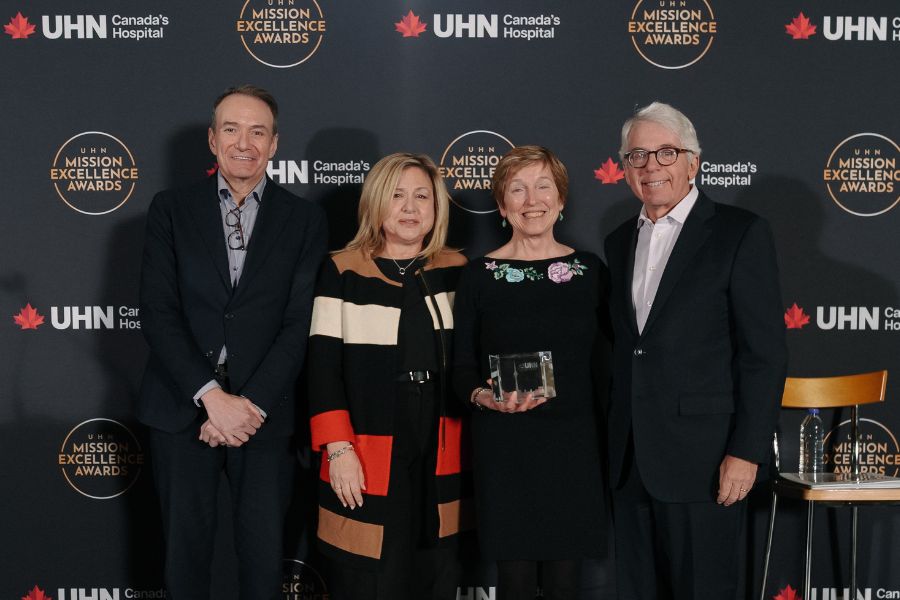By Dr. Joy Richards and Dr. Brian Hodges
Both of us worked in long-term care before coming to UHN. We know how special and rewarding it is as a career, and attach great value to it. So, as UHN’s Chief Nurse and Chief Doctor, we quickly responded to the call from Kevin Smith in mid-April for TeamUHN members to help in a pair of Toronto long-term care homes. We were not alone.
That first weekend, just days after Premier Doug Ford called on hospital CEOs to support long-term care centres (LTCs) in outbreak, dozens of our colleagues, including nurses, physicians, allied health professionals, support staff, learners and administrators, volunteered as personal support workers (PSWs) at two downtown facilities run by Rekai Centres. In a front-page story in the Toronto Star that weekend, Rekai CEO Sue Graham-Nutter lauded the efforts by those from UHN, who were replacing her team members who had fallen ill with COVID-19 or stopped coming in over fear of getting sick. She described their efforts as like a “giant bear hug.”
‘Early on, it was about assessing needs. It was clear that what was required was boots on the ground, people to wear personal protective equipment (PPE). The situation was urgent.’
– Dr. Joy Richards and Dr. Brian Hodges
Early on, it was about assessing needs. It was clear that what was required was boots on the ground, people to wear personal protective equipment (PPE). The situation was urgent. Most who heeded Kevin’s call had no LTC experience. Admittedly, not all knew what they were signing up to do. The work was basic and vital: feeding, bathing, toileting. Motivations varied. For some, personal experiences with aging parents or grandparents drew them. Others were unfamiliar with elder care and emerged shaken. The common currency was compassion. They might not have known how to do this work but they knew that it must be done. Lives were depending on it.
That’s not hyperbole. It’s reality. More than half of all deaths from COVID-19 in Ontario have been long-term care residents. By expanding the role of partnership with LTCs – the number is now 13 across Toronto, up from the original two Rekai homes – UHN is taking its social responsibility seriously. Since last spring, we have provided on-going weekly support and consultation through UHN Infection Prevention and Control (IPAC) at the many of those homes. We also continue swabbing and testing LTC residents for the coronavirus. In recent weeks, efforts by our teams, together with Toronto Public Health, city staff and our colleagues from eight other hospitals and about 160 LTCs, retirement homes and congregate living sites, have helped vaccinate thousands of Toronto’s most vulnerable.
LTCs got where they were at the start of the pandemic for a variety of reasons. The key to their future is not dismantling them. It is also not having UHN and other health networks take them over. The key is partnerships. Just as the two of us have worked together in leadership roles at UHN over the years and grown to trust each other and have respect for our individual domains, we saw that play out the first weekend at Rekai Centres. Nurses, doctors, allied health professionals and administrators came together on a level playing field. There was no hierarchy. Everybody was helping everybody. Yes, to be sure, at times it was chaotic but we were all in it together. It was an illustration to us of teamwork. There was no, “oh, that’s not my job.” It was about coming together to deliver compassionate care and knowing each of us had a role to play.
That same spirit must be applied to the future of long-term care. We are wrong to think of UHN as a hospital, or collection of hospitals. As our name suggests, we are a health network. That means primary care to community care to transitional rehabilitation to long-term care. We have all these pieces. What has not yet happened is truly welcoming long-term care into the overall system. That must change. The response of UHN and other health networks to the crisis in long-term care proves we have the ability to step up, provide expertise and be part of a lasting solution.
‘There was no, ‘oh, that’s not my job.’ It was about coming together to deliver compassionate care and knowing each of us had a role to play.’
– Dr. Joy Richards and Dr. Brian Hodges
The relationship building of the past year must be extended and enhanced. It cannot be a situation in which the hospitals dominate. Our LTC colleagues have taught us a tremendous amount about their work. We are humbled to realize we don’t know what we don’t know about long-term care. In one of the LTCs recently visited by UHN’s Mobile Team Vaccine there hangs a sign that reads: “Our residents do not live in our workplace. We work in their home.” That home-like, family environment is a very different one than ours in acute care, and it needs to be respected and embraced. Higher value must be placed on the work long-term care staff do. By further developing our relationships, doors will open to these and other bigger conversations. We envision a future where the bonds between UHN and LTCs are even stronger. For example, UHN Nurse Managers and LTC Executive Directors take secondments in each other’s workplaces to build capacity and knowledge, or physicians in LTCs routinely come together to discuss the care issues they face.
If we want to truly embrace integrated care, it’s clear how important these relationships are. COVID-19 has amplified that. This isn’t about domination and takeovers but about strengthening relationships, developing functional communities of practice, sharing expertise. We have learned much, and have much more to learn. The biggest lesson is that we are stronger together.
Dr. Joy Richards, VP Patient Experience and Chief Health Professions, UHN, worked for about 20 years in long-term care, first at a tiny place on Montreal’s West Island, then at Baycrest in Toronto.
Dr. Brian Hodges, EVP Education and Chief Medical Officer, UHN, became a PSW in high school on the geriatric ward at Royal Victoria Hospital in Barrie, Ont. staying on the job through summers in university.


